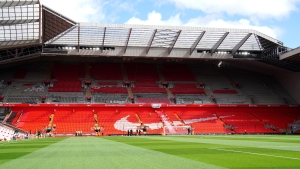Football Association chief executive Mark Bullingham has raised the prospect of the game’s lawmakers examining whether audio between referees and VARs should be available live.
Miscommunication between VAR Darren England and referee Simon Hooper led to a Luis Diaz goal for Liverpool at Tottenham being wrongly disallowed last month, leading to further calls for such conversations to be played out in real time.
The incident caused huge controversy, with Reds manager Jurgen Klopp even calling for the match to be replayed.
Broadcasting the conversations between on-field officials and VARs live is currently prohibited under football’s laws.
Bullingham, who is a director at the International Football Association Board (IFAB) which has the power to change the game’s laws, said the organisation had discussed the subject but added: “Generally there is a split in the room over that, and quite often it is between the marketing and commercial people and the referees.
“Our point of view, from the marketing and commercial perspective, would normally be that transparency is a really good thing, and we want fans to have the maximum experience.”
Bullingham said an ongoing FIFA trial where referees announce and explain the outcome of an on-field review is a “step in the right direction” but added: “My personal point of view is I do think (live audio) will continue to be a question over time, because the greater transparency shows how difficult the referee’s job is, and it has worked in other sport.
“There is an understandable nervousness from others that the referee’s job is hard enough as it is. In a tournament you have referees with multiple languages, so it is not as straightforward as some might suggest.
“So I think we are taking a step in the right direction with announcing the decision and explaining why it has been reached. Let’s see if that leads to further progression.”
Bullingham’s Irish FA counterpart and fellow IFAB director Patrick Nelson spoke more cautiously on the VAR decision-making process, adding: “We just need to see more evidence on this at the moment.
“It’s interesting when we look at recent examples but we still need to remember that VAR as an entire concept is relatively in its infancy compared to the game of football and compared to IFAB. There is still more that we can learn.”
The PA news agency understands the IFAB is set to open up the trial of in-stadium announcements by referees beyond FIFA events to other interested competitions.
The IFAB may also look again at the wording of Principle 10 in the VAR protocol, which currently prevents VARs from revisiting a decision once play has restarted and meant the officials could not call play back after the Diaz error.
It could be updated to allow a decision to be revisited where a clear mistake has occurred, and where no significant action has taken place since play restarted.
Bullingham also said he was aware IFAB had been asked to consider widening the scope of VAR to rule on decisions such as corner kick and free-kick awards.
“I think we would be really reluctant to have a game that was stopped a lot more than it currently is, but that will be a proper discussion,” he added.
VAR interventions are currently limited to goals, penalties, straight red cards and mistaken identity.





























